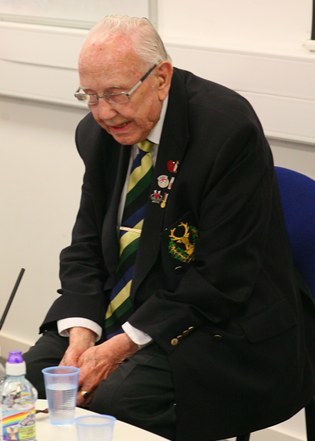Saturday’s line-up at Dundee Literary Festival prolonged the week’s pattern of appreciative audiences being knocked for six by wonderful words.
The “wow” factor of words what Chekhov summed up as, “Don’t tell me the moon is shining; show me the glint of light on broken glass” was conveyed by a fascinating array of authors.
Saturday brought old soldier Alistair Urquhart, a new writer in his nineties, his Forgotten Highlander now a Sunday Times bestseller, and tickled pink by its success. It brought Iain Banks, almost uniquely an international bestseller in two genres. It nurtured new talent a feature of the festival with readings by The Nethergate Writers from Dundee University’s continuing as a writer class.
A must-have fix of non-fiction was gleaned from Stuart Kelly’s critical study of Sir Walter Scott’s in his new book Scottland: How a Writer Invented A Nation.
No Scottish author enjoyed such success and none such a fall from grace.
There are 60 Waverley Roads in Scotland named after Scott’s novels, 40 flowers called after his heroines, and 70 operas based on his works. There are more statues of Scott than any other person in Scotland, including Burns and Queen Victoria. When the construction of the Scott Monument in Princes Street ran out of funds, the workers finished it without pay.
Kelly convinced his audience of the absolute impact his hero had on this little country. Before Scott, we were regarded by the educated English as backward, primitive, even dangerous. His novels transformed this perception and the literary prejudices of the age.
When Lady Of The Lake appeared in 1810, 297 coaches arrived at Loch Lomond, over 200 more than the previous year.
“Scotland was changed in a generation from being a savage and treacherous place to being a tourist destination,” said Kelly.
Landowners even began altering their mansions to look like how they were described or illustrated in Scott’s novels.
So his name and image are with us everywhere, but Kelly also explained Scott’s fall from favour; how the rambling writings of a man in decline tarnished his reputation, and how the novels once read by the elite became a standard school prize for children.
Who reads the famous but fabulously fallen Scott today? Who champions his influence and impact? Well, Stewart Kelly’s intervention may help to restore the place in our history Scott surely deserves on this reading.
Nethergate Writers drew a large audience to the university’s Dalhousie Building for readings from WhoDunWhat, their latest anthology of short stories and poems. This collection was derived from an invitation to library users in Dundee to suggest characters and situations for students to develop in class work.
Submitted topics ranged from “a transformation through a brief encounter,” to “three old men meet in a pub for esoteric discussion” and “an elderly lady gets the chance to play a leading role in a blockbuster.”
Members of the group clearly had fantastic fun applying creative writing skills to the task with good-natured, have-a-go guile. Try it at home.
Lunchtime, aptly, brought the third and final Poem And A Piece event, a gathering with snacks, drinks, poetry … and mouth organ music.
Tom Bryan began his stint by sprinkling the opening lines of Chaucer’s 14th century Canterbury Tales with 1950s’ American mouth organ blues to prove his music teacher’s adage that poetry was “a house with many rooms.”
Point breathlessly made, the widely-published Canadian-Scots poet revealed some of the influences on his writing and how he recorded them in verse.
One was a poignant memoir of his homesteader grandmother, who recalled survivors of the Wounded Knee massacre coming to her cabin pleading for food for their horses. They were too proud to ask for it for themselves.
Bryan, a former writer-in-residence for Aberdeenshire Council and now Royal Literary Fund Writing Fellow for York University, entertained with more commercially-orientated poems, ranging in location from Selkirk Post Office, to Joan Miro’s Catalonia to the 1906 San Francisco earthquake.
Bryan also detailed Dundonians who had made their name in North America, notably the radical William Lyon Mackenzie.
With the venue of his talk in mind, he might have added Dundee’s prince of bad verse William McGonagall, who committed the death of Lord and Lady Dalhousie to immortality with these lines…
“Alas! Lord and Lady Dalhousie are dead and buried at last,”Which causes many people to feel a little downcast.”
And finally a chance to hear new Dundee International Book Prize winner Alan Wright explaining how living in Wigan smoothed the progress of the Victorian mystery that took the £10,000 prize.
All credit to Birlinn/Polygon for continuing to support Britain’s biggest prize for a debut novel and, of course, to the Dundee Literary Festival organisers for a wonderful success.
